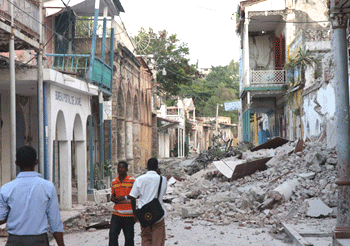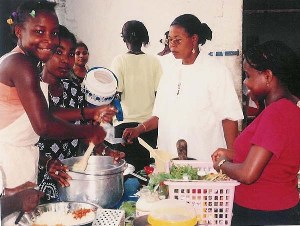Scholes Seeks Long-Term Assistance for the People of Jacmel, Haiti
 |
In Jacmel, known as a center for Haitian art, Tuesday's earthquake caused massive destruction. A major road was blocked, hampering the delivery of food and water. (Photo Andrew Bigosinski, Cine Lekol, Jacmel) |
For information on how to support relief efforts, visit UAlbany Haiti Relief Fund.
UAlbany professor Charles P. Scholes and his wife Nancy were moments from heading out the door on their way to the airport Jan. 12 for their flight to Haiti when they learned that an earthquake had struck the struggling nation. Their flight was cancelled.
Scholes, a chemistry professor, is co-president of Pazapa, an organization that assists children with disabilities in Jacmel, Haiti. He is torn between his relief at being safe in the U.S. and his concern for the staff and students of Pazapa. Pazapa is Haitian Creole for "step by step."
The most immediate problem facing Jacmel is that there is only one major road bringing supplies in from Port-au-Prince, and it has been blocked by the collapse of a mountain, according to Scholes.
"We have not personally reached anyone there but we have heard that our director and her family are safe. We don't know the status of our staff or students. We do not know precisely what happened to the building but we have seen a crushed building almost across the street from where Pazapa is," said Scholes.
Typically, about 100 children with developmental disabilities, some as young as 3, receive schooling there during the day. Visiting volunteer physicians have helped provide care and perform surgeries to correct problems that would be fixed almost immediately in the U.S. but are virtually unavailable in this impoverished Caribbean nation. There is an outreach program for children and their parents in the surrounding mountains. A staff of 22 operates on a budget of $105,000 a year.
The Pazapa school provides learning opportunities for young children who would likely otherwise slip through the cracks of Haiti�s education system: some may have Downs Syndrome, others may have autism, cerebral palsy, or seizure disorder. Some attend the Pazapa school for the deaf. They are taught reading and writing with the goal of being mainstreamed and accepted into their communities.
 |
Pazapa cares for about 100 children a day, providing learning opportunities for children with Downs Syndrome, autism, cerebral palsy or seizure disorder. |
But in the wake of the earthquake, the potential for a prolonged crisis impacting Pazapa is quite real. "With Jacmel cut off, over the next week or two we are going to see starvation, dehydration, and disease," said Scholes. "In a first world country devoted to social justice for all, the government would provide the services Pazapa provides. As it is, the responsibility for providing these services is ours.�
Scholes became active in Pazapa after his son Jonathan E. Scholes, 33, died in 2007 of an aggressive cancer. Jonathan had a life-changing experience through the Peace Corps at Pazapa in the 1990s. His parents contributed to Pazapa before his death, and now they channel their grief toward continuing his work. Scholes is the co-president of the Pazapa USA Board.
Scholes is one of a number of University students, alumni, faculty and staff who have ties to Haiti. French program faculty members Eloise and Jean-Francois Bri�re teach and write about Haiti. They have taken students to visit there, recruited Haitian students to UAlbany programs, and worked with UAlbany's Haitian Student Association. In addition, Eloise Bri�re works with Fonkoze, a Haitian foundation that provides micro finance funds to Haiti's rural poor to create self-sustaining businesses.
![]() For more news, subscribe to UAlbany's RSS headline feeds
For more news, subscribe to UAlbany's RSS headline feeds


